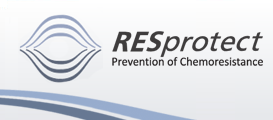| RP101 Orphan Drug Designation |

|

|

|
RP101 Granted U.S. Orphan Drug Designation for Pancreatic CancerIn November 2007, RP101 was granted Orphan Drug designation for the adjunct treatment of pancreatic cancer by the U.S. Food and Drug Administration (FDA). This designation will allow SciClone a seven-year period of market exclusivity once RP101 is approved. The Orphan Drug designation is intended to provide incentives to drug and biologics suppliers to develop and supply drugs for the treatment of rare diseases, currently defined as diseases that affect fewer than 200,000 individuals in the United States. RESprotect will apply for the European EMEA orphan drug designation in 2009. About RP101: RP101’s potential efficacy for treating cancer patients was discovered by the founder of RESprotect, Prof. Fahrig. RP101 has been evaluated in combination with cytostatic agents such as gemcitabine which is used to treat pancreatic, lung, ovarian and breast cancer patients. Although approved in several European countries for antiviral indications, RP101’s potential efficacy to combat chemoresistance and improve chemosensitivity constitutes a new clinical use for RP101 which is protected by three use patents by RESprotect. In two separate, unrelated phase 1 clinical trials with late-stage pancreatic cancer patients, RP101 was used in combination with gemcitabine, the current standard of care, or gemcitabine + cisplatin. The results were published in 2006 (Fahrig, et al., Anti-Cancer Drugs 17, 2006, 1045-56). In summary, RP101 co-treatment approximately doubled median survival. Moreover, 4 - 5 times more patients with far metastases (stage IV) survived one year or longer in comparison with the gemcitabine-alone group. About RESprotect: RESprotect GmbH is a privately owned Biotech Company located in Dresden/Germany. RESprotect is focusing on the inhibition of chemoresistance and the enhancement of chemosensitivity. Chemogenomics, the approach of Resprotect, focuses on the application of small synthetic molecules, which elicit favourable phenotypic changes. The combination with genomic tools concentrating on specific biological pathways allows a better understanding of the broader effect of a drug. Thus, it is possible to discover drugs that target the cause of a disease rather than its symptoms. RESprotect's compounds are given additionally to standard chemotherapy. In contrast to the well known efforts to circumvent or decrease existing chemoresistance, RESprotect´s approach is unique.
|


